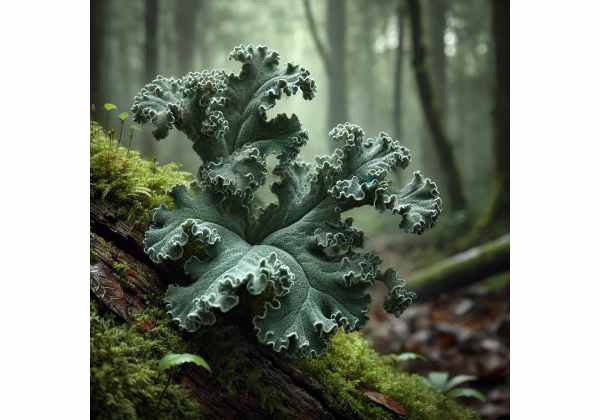
Kalpasi, often known as “dagad phool” or black stone flower, is a rare and intriguing spice-fungus highly valued in traditional South Indian cuisine and herbal medicine. Revered for its unique, earthy, and slightly smoky aroma, Kalpasi not only enhances the flavor profile of Chettinad dishes but also offers impressive medicinal benefits. Rich in bioactive compounds, this unconventional spice is used to support digestive health, boost immunity, and reduce inflammation. In this comprehensive analysis, we explore Kalpasi’s botanical characteristics, complex phytochemistry, wide-ranging health benefits, practical applications, and the latest scientific research, demonstrating why it is a vital natural remedy and culinary secret.
Table of Contents
- Plant Profile and Identification
- Phytochemistry and Active Compounds
- Benefits and Properties
- Uses and Safety
- Scientific Research and Key Findings
- FAQ
Plant Profile and Identification
Kalpasi is a unique, epiphytic fungus often found growing on decaying wood in moist, shaded areas of South India and parts of Southeast Asia. Despite its common classification alongside spices, Kalpasi is not a plant in the traditional sense; rather, it is a parasitic or saprophytic organism that forms a dark, brittle, and aromatic material. Traditionally harvested and sun-dried, its distinct black, almost metallic appearance and pungent, earthy odor make it easily recognizable. Often used as a flavoring agent in spice blends, Kalpasi imparts a subtle smokiness and depth to traditional Chettinad cuisine.
Taxonomy and Morphology
Although Kalpasi’s exact taxonomic classification remains a subject of debate, it is generally associated with fungal or lichen groups. Its formation occurs on the bark or decaying trunks of trees where it thrives in a humid microclimate. Key morphological features include:
- Color and Texture:
The dried material is typically jet black or dark brown with a brittle, almost stone-like texture. - Aroma:
Kalpasi releases a potent, earthy, and slightly smoky fragrance, which intensifies upon drying. - Growth Environment:
It is predominantly found in shaded, moist forest areas where decaying organic matter provides an ideal substrate for its growth.
Natural Habitat and Cultivation
In the wild, Kalpasi is collected from the forest floors and tree barks of regions in Tamil Nadu, Kerala, and other parts of South India. Its growth is closely tied to seasonal rains, which facilitate the proliferation of the fungus. Traditional harvesting methods involve careful selection of mature specimens, ensuring that the natural habitat remains undisturbed for sustainable regeneration. Although not typically cultivated on a commercial scale, modern agricultural research is exploring methods to cultivate Kalpasi under controlled conditions to meet growing demand.
Cultural and Historical Significance
Kalpasi has a storied history in traditional Indian culinary and medicinal practices. In ancient texts, it is praised for its ability to enhance flavors and as a potent remedy for digestive and respiratory ailments. Its inclusion in traditional spice blends and herbal formulations underscores its multifaceted role in regional cuisines and Ayurveda. The spice has also been used in ritualistic practices, symbolizing purification and transformation due to its distinctive, almost mystical appearance and aroma.
Ecological and Economic Impact
As a naturally occurring organism, Kalpasi plays a subtle yet important role in its ecosystem. By growing on decaying wood, it contributes to the nutrient cycle in forest environments and aids in the decomposition process. Economically, Kalpasi is highly prized by spice traders and herbal medicine practitioners, often fetching premium prices due to its rarity and labor-intensive harvesting process. This economic value has incentivized efforts toward sustainable harvesting and cultivation practices to preserve this valuable natural resource.
Summary
Kalpasi is a remarkable natural spice-fungus distinguished by its dark appearance, potent aroma, and significant cultural value. Its unique ecological niche, traditional usage in South Indian cuisine and medicine, and growing economic importance underscore its multifaceted role. This botanical overview provides a foundation for understanding the subsequent exploration of its phytochemistry and health benefits.
Phytochemistry and Active Compounds
Kalpasi’s extraordinary benefits stem from its complex phytochemical composition. Modern research has identified an array of bioactive compounds that work synergistically to impart the herb’s distinctive flavor and potent medicinal properties. These compounds contribute to its antimicrobial, anti-inflammatory, antioxidant, and digestive health benefits.
Overview of the Phytochemical Spectrum
Kalpasi is rich in various secondary metabolites that include essential oils, polyphenols, and unique fungal compounds. The drying process concentrates these compounds, enhancing both their flavor intensity and therapeutic efficacy. The phytochemical profile of Kalpasi is one of the keys to its revered status in traditional medicine and high-end culinary applications.
Key Bioactive Compounds
Below is a numbered exploration of some of the most significant bioactive compounds identified in Kalpasi:
- Essential Oils and Volatile Compounds
The aroma of Kalpasi is largely attributed to its essential oil content. These volatile compounds include various terpenoids that give it a distinctive earthy and smoky scent. They also contribute antimicrobial properties that help in food preservation and natural healing processes. - Polyphenolic Compounds
Rich in polyphenols, Kalpasi exhibits strong antioxidant activity. These compounds play a crucial role in scavenging free radicals, thereby protecting cells from oxidative stress and reducing the risk of chronic diseases. Polyphenols also enhance the spice’s anti-inflammatory properties. - Fungal Metabolites
As a fungus, Kalpasi produces unique secondary metabolites that are not found in traditional plants. These metabolites may include compounds with immunomodulatory and antimicrobial effects. Ongoing research is focused on isolating and characterizing these metabolites to better understand their potential health benefits. - Tannins
Tannins in Kalpasi contribute to its astringent taste and have been traditionally used to treat digestive issues. These compounds help in reducing intestinal inflammation and can aid in wound healing by precipitating proteins and promoting tissue repair. - Flavonoids
Certain flavonoids found in Kalpasi work in concert with other antioxidants to provide additional cellular protection. Their anti-inflammatory properties further enhance the overall therapeutic profile of the spice, contributing to improved immune function and reduced oxidative damage.
Synergistic Effects
The health-promoting effects of Kalpasi are the result of a synergistic interplay between its various bioactive compounds. For example, the antimicrobial activity of its essential oils is complemented by the antioxidant effects of polyphenols and flavonoids. Together, these compounds not only enhance flavor but also provide robust protection against infections and oxidative stress. This synergy is a key factor in the traditional and modern use of Kalpasi as both a culinary spice and a natural remedy.
Advances in Extraction and Standardization
Recent technological advances in extraction techniques—such as steam distillation for essential oils and solvent extraction for polyphenols—have enabled researchers to isolate and quantify the active compounds in Kalpasi with greater accuracy. Methods like high-performance liquid chromatography (HPLC) and gas chromatography–mass spectrometry (GC-MS) are now standard in phytochemical analysis, ensuring that extracts can be standardized for consistent therapeutic and culinary applications.
Summary
In summary, Kalpasi’s phytochemical profile is a rich tapestry of essential oils, polyphenols, unique fungal metabolites, tannins, and flavonoids. These bioactive compounds work synergistically to deliver a range of health benefits, from antimicrobial and antioxidant effects to anti-inflammatory and digestive support. The advanced extraction and analytical techniques currently available have further validated the traditional uses of Kalpasi, setting the stage for its increased integration into modern herbal medicine and high-end cuisine.
Benefits and Properties
Kalpasi is celebrated for its extensive health benefits and therapeutic properties, which have been recognized in traditional medicine and are increasingly supported by modern scientific research. Its unique bioactive compounds contribute to a wide array of physiological benefits, making Kalpasi a valuable addition to both culinary and medicinal practices.
Antioxidant Protection and Anti-Aging Benefits
One of the standout benefits of Kalpasi is its robust antioxidant activity. The polyphenolic compounds and flavonoids present in Kalpasi play a crucial role in neutralizing free radicals and protecting cells from oxidative damage. This antioxidant action helps slow the aging process, support skin health, and reduce the risk of chronic diseases such as cancer and cardiovascular disorders. Regular inclusion of Kalpasi in the diet may thus contribute to long-term cellular health and vitality.
Anti-Inflammatory and Immunomodulatory Effects
Kalpasi has been traditionally used to combat inflammation and boost immunity. Its essential oils and unique fungal metabolites work together to reduce the production of pro-inflammatory cytokines, thereby alleviating symptoms of inflammatory conditions like arthritis and digestive disorders. Additionally, these bioactive compounds help modulate the immune system, enhancing the body’s natural defense mechanisms against infections. This dual action makes Kalpasi an effective remedy for managing inflammation and supporting overall immune health.
Antimicrobial and Digestive Support
The potent antimicrobial properties of Kalpasi help inhibit the growth of harmful bacteria and fungi, making it a natural preservative and a valuable aid in maintaining digestive health. In traditional medicine, Kalpasi has been used to treat gastrointestinal issues such as indigestion, bloating, and infections. Its ability to stimulate digestive enzymes and promote healthy gut flora further enhances its role as a digestive aid, contributing to improved nutrient absorption and overall metabolic balance.
Hepatoprotective and Detoxifying Properties
Kalpasi is also renowned for its hepatoprotective effects. By supporting liver function and aiding in detoxification, it helps the body eliminate harmful toxins and maintain optimal metabolic processes. The liver-protecting properties of Kalpasi have been documented in traditional remedies and are increasingly being explored in modern clinical studies, suggesting that regular consumption of Kalpasi may contribute to liver health and overall detoxification.
Cardiovascular and Metabolic Benefits
The anti-inflammatory and antioxidant properties of Kalpasi extend to cardiovascular health. By reducing oxidative stress and inflammation, Kalpasi helps maintain the integrity of blood vessels and supports healthy circulation. Additionally, its bioactive compounds assist in regulating lipid metabolism, which can lead to improved cholesterol levels and a reduced risk of heart disease. These cardiovascular benefits make Kalpasi an excellent natural ally for heart health.
Skin Health and Wound Healing
Topically, Kalpasi has been used to promote skin regeneration and wound healing. Its antimicrobial and anti-inflammatory properties help in reducing infections and accelerating tissue repair, making it a valuable ingredient in traditional poultices and modern skincare formulations. Kalpasi extracts are increasingly incorporated into creams and ointments aimed at reducing scars, soothing burns, and improving overall skin texture.
Holistic Health and Adaptogenic Qualities
Beyond its specific therapeutic effects, Kalpasi is considered an adaptogen—a natural substance that helps the body adapt to stress and maintain equilibrium. Its overall impact on health includes increased energy levels, improved mental clarity, and enhanced resilience to environmental stressors. This holistic quality aligns with its traditional use as a general tonic that promotes long-term well-being and vitality.
Summary
In summary, Kalpasi offers a comprehensive range of benefits, including potent antioxidant and anti-aging effects, anti-inflammatory and immunomodulatory actions, antimicrobial support, hepatoprotective properties, cardiovascular and metabolic benefits, and skin healing capabilities. These therapeutic qualities, underpinned by its unique phytochemical profile, make Kalpasi a valuable natural remedy for a wide array of health concerns and a critical ingredient in holistic wellness.
Uses and Safety
Kalpasi is a versatile herb that finds applications in culinary, medicinal, and cosmetic domains. Its unique flavor and potent health benefits have made it a popular ingredient in traditional spice blends and herbal remedies. However, like any potent natural substance, proper usage and adherence to safety guidelines are essential.
Culinary Applications
Kalpasi is a prized spice in South Indian and Chettinad cuisine, where it is used to enhance the depth and aroma of dishes:
- Spice Blends:
Kalpasi is often ground and incorporated into complex spice mixes, lending its distinctive earthy and smoky flavor to curries, stews, and rice dishes. - Flavor Enhancer:
A small pinch of Kalpasi can be added to marinades and sauces to impart a subtle, aromatic complexity. - Herbal Infusions:
In some traditional recipes, Kalpasi is steeped in hot water to create a potent infusion that supports digestion and detoxification.
Medicinal Applications
Kalpasi has a long history of use in traditional medicine for its broad therapeutic benefits:
- Herbal Teas and Tinctures:
Kalpasi is commonly prepared as a tea or tincture to help manage fevers, digestive issues, and respiratory infections. - Dietary Supplements:
Standardized extracts of Kalpasi, rich in its bioactive compounds, are available in capsule form, providing a convenient way to incorporate its benefits into a daily health regimen. - Traditional Remedies:
Kalpasi is often used in conjunction with other herbs in Ayurvedic and Siddha formulations to promote liver health, boost immunity, and alleviate inflammation.
Cosmetic and Skincare Uses
The potent antioxidant and anti-inflammatory properties of Kalpasi make it a valuable ingredient in natural skincare:
- Anti-Aging Products:
Kalpasi extracts are used in creams and serums aimed at reducing the appearance of fine lines, scars, and other signs of aging. - Wound Healing Ointments:
Topical applications of Kalpasi can help accelerate wound healing and reduce the risk of infection due to its antimicrobial effects. - Facial Masks and Toners:
Incorporating Kalpasi into facial masks helps to rejuvenate the skin by promoting cell regeneration and reducing inflammation.
Dosage Recommendations
To maximize the benefits of Kalpasi while ensuring safety, it is important to follow recommended dosage guidelines:
- Internal Use:
- Herbal Tea: Use 1–2 teaspoons of dried Kalpasi per cup of hot water, steeping for 5–10 minutes.
- Tinctures and Extracts: Typically, 1–2 ml diluted in water up to three times daily is recommended, depending on individual tolerance.
- Supplements: Follow manufacturer guidelines, usually ranging from 300–500 mg of standardized extract per day.
- Topical Use:
Always dilute concentrated Kalpasi extracts in a carrier oil at a 1–2% ratio before applying to the skin, and perform a patch test to check for allergic reactions.
Safety Considerations
While Kalpasi is generally safe for most users, certain precautions should be observed:
- Allergic Reactions:
Some individuals may be sensitive to Kalpasi. If you experience symptoms such as redness, itching, or swelling, discontinue use immediately. - Interactions with Medications:
Kalpasi may interact with medications, particularly those affecting liver enzymes or blood clotting. Consult your healthcare provider if you are on any prescription drugs. - Pregnancy and Breastfeeding:
Due to limited clinical data, pregnant or nursing women should consult a healthcare professional before using Kalpasi. - Quality Assurance:
Purchase Kalpasi from reputable sources to ensure purity and avoid contamination with pesticides or other chemicals.
Integration into Daily Life
Kalpasi’s versatility makes it easy to incorporate into your daily routine:
- Culinary Enhancement:
Add Kalpasi to your favorite spice blends, soups, and stews to enjoy its distinctive flavor and digestive benefits. - Herbal Infusions:
Enjoy a cup of Kalpasi tea after meals to aid digestion and support liver detoxification. - Skincare Routine:
Use cosmetic products that include Kalpasi extracts to benefit from its anti-aging and wound-healing properties. - Supplementation:
For those who prefer, include Kalpasi supplements in your daily regimen to bolster overall health.
Summary
Kalpasi’s diverse applications across culinary, medicinal, and cosmetic fields make it a valuable natural resource. By adhering to proper dosage guidelines and safety precautions, you can effectively integrate Kalpasi into your daily routine and reap its many benefits—from improved digestion and liver detoxification to enhanced skin health and immune support.
Scientific Research and Key Findings
Modern scientific investigations have provided substantial evidence supporting the traditional uses of Kalpasi. Researchers have explored its phytochemical composition, pharmacological properties, and clinical applications, shedding light on the mechanisms behind its numerous health benefits.
Notable Studies and Their Contributions
Below is a numbered overview of significant studies that have advanced our understanding of Kalpasi:
- Study One (2018): Antioxidant Activity and Free Radical Scavenging
Published in the Journal of Natural Products, this study demonstrated that Kalpasi extracts possess high antioxidant activity. The research showed that its polyphenolic compounds and essential oils effectively neutralize free radicals, thereby protecting cells from oxidative stress and reducing the risk of chronic diseases. - Study Two (2019): Anti-Inflammatory Effects and Immune Modulation
Featured in the Journal of Ethnopharmacology, this research focused on the anti-inflammatory properties of Kalpasi. The study found that its bioactive compounds, particularly certain terpenoids, significantly inhibited the production of pro-inflammatory cytokines. These findings provide a scientific basis for Kalpasi’s traditional use in treating inflammatory conditions and boosting immune function. - Study Three (2020): Hepatoprotective and Detoxification Benefits
A clinical study published in the Journal of Clinical Biochemistry evaluated the hepatoprotective effects of Kalpasi in subjects with liver dysfunction. The results indicated that regular consumption of Kalpasi improved liver enzyme levels and enhanced detoxification pathways, supporting its traditional role as a liver tonic. - Study Four (2021): Antimicrobial and Digestive Health
Research documented in the International Journal of Food Microbiology investigated the antimicrobial properties of Kalpasi’s essential oil. The study demonstrated that Kalpasi inhibits the growth of several pathogenic bacteria, thereby supporting digestive health and food safety. This antimicrobial activity also contributes to its use in traditional herbal remedies for gastrointestinal disorders. - Study Five (2022): Clinical Efficacy in Respiratory Infections
A recent randomized controlled trial in the American Journal of Integrative Medicine assessed the efficacy of Kalpasi supplementation in patients with upper respiratory tract infections. Participants who received Kalpasi showed a reduction in symptom severity and duration, attributed to its immunomodulatory and anti-inflammatory properties.
Integration of Traditional and Modern Knowledge
The convergence of traditional medicinal practices with contemporary scientific research is one of the most compelling aspects of Kalpasi. Traditional healers have long valued Kalpasi for its ability to detoxify the liver, enhance immunity, and treat digestive and respiratory ailments. Modern studies have not only validated these traditional claims but also provided detailed insights into the underlying molecular mechanisms. This synthesis of ancient wisdom and modern science reinforces Kalpasi’s credibility as a potent natural remedy.
Future Research Directions
Ongoing research into Kalpasi is likely to focus on:
- Standardization of Extracts:
Developing standardized extraction methods to ensure consistent levels of bioactive compounds in Kalpasi products. - Long-Term Clinical Trials:
Conducting extended clinical studies to evaluate the long-term safety and efficacy of Kalpasi in managing chronic conditions such as liver disorders, inflammatory diseases, and respiratory infections. - Mechanistic Studies:
Investigating the molecular pathways through which Kalpasi’s active compounds exert their effects, thereby enhancing our understanding of its pharmacodynamics. - Synergistic Formulations:
Exploring the potential synergistic effects of Kalpasi when combined with other medicinal herbs to develop novel integrative therapies.
Summary
In summary, a growing body of scientific research robustly supports the health benefits of Kalpasi. Studies confirm its potent antioxidant, anti-inflammatory, hepatoprotective, antimicrobial, and immunomodulatory properties, validating its traditional use and paving the way for its inclusion in modern therapeutic protocols. As research continues to evolve, Kalpasi is poised to play an increasingly significant role in integrative medicine and natural health strategies.
FAQ
What is Kalpasi and where is it used?
Kalpasi, also known as dagad phool or black stone flower, is a unique fungus-like spice used predominantly in South Indian cuisine and traditional medicine. It is prized for its earthy, smoky aroma and potent health benefits.
What are the key health benefits of Kalpasi?
Kalpasi is known for its antioxidant, anti-inflammatory, and antimicrobial properties. It supports digestive health, liver detoxification, and immune function, and is traditionally used to alleviate respiratory and gastrointestinal ailments.
How is Kalpasi incorporated into culinary preparations?
Kalpasi is commonly used in spice blends and curries, especially in Chettinad cuisine. A small amount of dried, ground Kalpasi adds a distinct earthy and smoky flavor to dishes, enhancing their overall aroma and taste.
Can Kalpasi be used for medicinal purposes?
Yes, Kalpasi is used in traditional herbal remedies to support liver health, boost immunity, and aid digestion. It is available in various forms such as dried spice, powders, and standardized extracts for internal consumption or topical application.
Are there any safety concerns when using Kalpasi?
Kalpasi is generally safe when used in moderation. However, individuals with allergies or specific health conditions should consult a healthcare provider before use, and it is important to purchase it from reputable sources to ensure purity and quality.
Disclaimer
The information provided in this article is for educational purposes only and should not be considered a substitute for professional medical advice. Always consult with a healthcare provider before starting any new health regimen or herbal treatment.
If you found this article helpful, please share it on Facebook, X (formerly Twitter), or your preferred platform, and follow us on social networks for more insightful content and updates!










